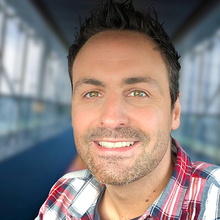Digital transformation for the benefit of citizens
Published on 17/05/2022 in Inspire
“Citizens and consumers want a simple, fluid and personalized experience. Whenever they desire," explains Sandro Manzo, Center of Exellence Lead Analytics, Things & Applications and partner for Proximus’ smart cities in the making.

Nowadays, we do our shopping and make payments online before going to bed. We have also become more demanding with regard to public authorities. "There's no reason to have to print out a document in the digital age, buy an envelope at the store and a stamp at the post office to get in touch with your public services," summarizes Sandro Manzo, CoE Lead Analytics, Things & Applications at Proximus.
The customer at the center of the experience
"Companies have had to put the customer back at the center of the experience. And now, it's the cities' turn. Citizens/consumers want a simple, fluid and personalized experience that they can have whenever they choose," sums up this expert in smart cities at a time when towns of all sizes in Belgium are being offered digital transformation.
Besides optimizing the citizen's experience, this digitization of public operators helps to strengthen data security, improve collaboration and internal processes, and make progress in anticipating events for the benefit of that security.
Towns are careful not to leave anyone on the wayside of the digital highway.
Sandro Manzo, CoE Lead Analytics, Things & Applications
Two pilot projects: Villers-la-Ville and the Eau d’Heure lakes
The pilot projects to analyze tourist numbers and experience carried out last year in partnership with Tourisme Wallonie at Eau d'Heure lakes and the Abbey of Villers-la-Ville have led to lessons being learned. "In Villers-la-Ville, the analysis of the data primarily showed that while the site was devoid of visitors from Brussels at a certain period, the same wasn't true of visitors from Wallonia or Flanders during the same period. This led to a targeted marketing campaign for the site. With positive and rapid effects as visitor number curves have since risen," Sandro explained.
Discover here the video with more information about the two pilot projects: Villers-la-Ville and the Eau d’Heure lakes.
Boosting tourism and local trade
Towns and municipalities can use this information to make quick and informed decisions to boost tourism, local trade and ensure that public money is invested where it is most needed. It can also ensure the safety of their citizens by accurately monitoring crowds at specific locations, such as sporting events or Christmas markets.
Proximus collects, cross-references and analyzes
How does that work? Proximus collects, cross-references and analyzes several types of data. Some data is uniquely linked to the mobile phone number connected to its antennas in a certain area, which allows extrapolation of the total number of visitors to that area. Data linked to demographic and statistical data which is available to everyone.
The data is consolidated and aggregated, and it's impossible to trace its origin to a particular person.
Sandro Manzo, Center of Excellence Lead Analytics, Things & Applications
Installing sensors to measure tourist numbers directly
"We also use third-party data, from financial partners for instance: transactions in shops per day and per sector of activity. And then we have our own sensors installed at the request of public partners by our data analysis specialists," Sandro added.
These sensors – Wi-Fi, smart cameras, etc. – are installed at strategic locations and allow accurate counting, outside or inside a building. "We measured exact visitor numbers in real time at all the vaccination centers in Wallonia, as well as air quality or the temperature of the refrigerators for health reasons. Some of this data was displayed on a screen at the entrance, and could be viewed remotely at any time by the center manager. If a threshold was exceeded, they could take corrective action immediately," he gives as an example.
Proximus provided IT support to 41 fixed and 12 mobile vaccination centers in Wallonia. This included very specific applications for temperature control of vaccines, the monitoring of CO2 concentrations and information displays for visitors.
'Data for good' projects
Important clarification: all the data mentioned is GDPR compliant. "It's consolidated and aggregated, and it's impossible to trace its origin to a particular person. It's always anonymous," specifies Sandro who emphasizes the ethics of this work. "Proximus only collects data in the context of 'data for good' projects. We don't want to participate in a big brotherization of society. We've already turned down projects that had other purposes," he insists.
Inclusion of 'generation mute'
In addition to the security of an area and its inhabitants, as well as the impact of events on local trade, another advantage of this digitization of towns is quite simply inclusion. “Towns are careful not to leave anyone on the wayside of the digital highway. This concerns senior citizens, for instance, who are provided with specific voicebots or a TV interface adapted to nursing homes and hospitals.
But there’s also 'generation mute', the millennial generation that prefers instant messaging and text messages to a phone call for any interactions with their loved ones, or in this case, towns," emphasized Sandro.
"As such, we help public services to diversify their communication channels by being present and available to their citizens on WhatsApp, Messenger and Facebook, while controlling management and costs. A necessary challenge at a time when the citizen/consumer experience must be a top priority once again."
Sandro Manzo has been with Proximus for 20 years and is now Center of Excellence Lead Analytics, Things & Applications. In concrete terms, he leads a team of 12 people focused on various aspects of innovation, ranging from digital communications such as chatbot/voicebot, SMS, WhatsApp and social networks, to connected objects, smart buildings, dynamic digital signage and data analysis.
Measuring is knowing. And thanks to data analytics, the city of Leuven can find out the number of visitors and where they come from.
One
One magazine is the Proximus B2B magazine for CIOs and IT professionals in large and medium-sized organisations.
